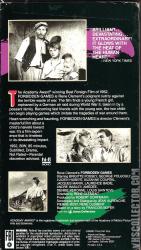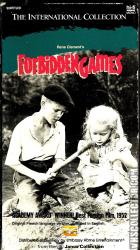Forbidden Games
Catalog Number
6065
-
Primary Distributor (If not listed, select "OTHER")
Catalog Number
6065
Primary Distributor (If not listed, select "OTHER")
Distributor Series
Release Year
Country
N/A (NTSC)
N/A | N/A | N/A
N/A | N/A
Jeux Interdits (1952)
Additional Information
Additional Information
War...and how it affects the lives of our children
One of the first films to see the horrors of war through the eyes of children, Forbidden Games was a critical smash, winning prizes from the New York Film Critics, the British Academy, and the Venice Film Festival. Adapted by Francois Boyer, director Rene Clement, and two others from Boyer's novel, the story focuses on Paulette (Brigitte Fossey), a five-year-old refugee from Paris taken in by a peasant family after her parents are killed during a bombardment of a civilian convoy. Michel Dolle (Georges Pujouly), the family's 11-year-old son, becomes her best friend, and they create a cemetery in which Paulette's dog is interred, along with other animals and insects, some of whom the children kill themselves. The Dolle family is too busy feuding with the Gouards, their neighbors, to notice the absence of the children. Eventually, authorities locate Paulette and insist that she be placed in an orphanage for legal adoption. Unsentimental and yet heartbreaking, Forbidden Games demonstrates the strategies of children who witness war to deal with the constant presence of death. It's also a bitter condemnation of the selfishness of adults who could offer their charges more love and protection.
While not initially successful in France, the film was a hit elsewhere. It won the Golden Lion at the Venice Film Festival, a Special Award as Best Foreign Language Film in the United States, and a Best Film from any Source at the British Academy Film Awards.
The film was widely praised among critics, whose "howling protests" were heard at the 1952 Cannes Film Festival where it was not an "official entry of France";[2] instead, it was "screened on the fringe of the Competition."[4]
The film was entered into competition at the 13th Venice International Film Festival; festival organizers at first considered the film ineligible because it had been screened at Cannes;[2] it ended up receiving the Golden Lion, the Festival's highest prize.
Upon its release, it was lambasted by some, who said it was a "vicious and unfair picture of the peasantry of France";[2] in France, 4,910,835 theater tickets were sold.[1] Following its December 1952 release in the United States, Bosley Crowther called it a film with "the irony of a Grand Illusion, the authenticity of a Harvest and the finesse of French films at their best"; according to Crowther, the film is a "brilliant and devastating drama of the tragic frailties of men, clear and uncorrupted by sentimentality or dogmatism in its candid view of life."[2]
At the 25th Academy Awards, Forbidden Games won an out-of-competition Special Award as Best Foreign Language Film.[3] In December 1952, at the 24th National Board of Review Awards it was chosen as one of that year's five top foreign films. At the 1952 New York Film Critics Circle Awards, it won for Best Foreign Language Film.
Im 1954, it was BAFTA's Best Film from any Source; in 1955, at the 27th Academy Awards, François Boyer was nominated for an Academy Award for Best Story; Philip Yordan won, for his work on Broken Lance.
Decades after its release, David Ehrenstein called it "deeply touching" and wrote: "Fossey's is quite simply one of the most uncanny pieces of acting ever attempted by a youngster. Clément’s sensitivity doubtless accounts for much of what we see here, but the rest is clearly Fossey’s own.
Release Date: December 8, 1952
Distrib: Times Film Corporation
One of the first films to see the horrors of war through the eyes of children, Forbidden Games was a critical smash, winning prizes from the New York Film Critics, the British Academy, and the Venice Film Festival. Adapted by Francois Boyer, director Rene Clement, and two others from Boyer's novel, the story focuses on Paulette (Brigitte Fossey), a five-year-old refugee from Paris taken in by a peasant family after her parents are killed during a bombardment of a civilian convoy. Michel Dolle (Georges Pujouly), the family's 11-year-old son, becomes her best friend, and they create a cemetery in which Paulette's dog is interred, along with other animals and insects, some of whom the children kill themselves. The Dolle family is too busy feuding with the Gouards, their neighbors, to notice the absence of the children. Eventually, authorities locate Paulette and insist that she be placed in an orphanage for legal adoption. Unsentimental and yet heartbreaking, Forbidden Games demonstrates the strategies of children who witness war to deal with the constant presence of death. It's also a bitter condemnation of the selfishness of adults who could offer their charges more love and protection.
While not initially successful in France, the film was a hit elsewhere. It won the Golden Lion at the Venice Film Festival, a Special Award as Best Foreign Language Film in the United States, and a Best Film from any Source at the British Academy Film Awards.
The film was widely praised among critics, whose "howling protests" were heard at the 1952 Cannes Film Festival where it was not an "official entry of France";[2] instead, it was "screened on the fringe of the Competition."[4]
The film was entered into competition at the 13th Venice International Film Festival; festival organizers at first considered the film ineligible because it had been screened at Cannes;[2] it ended up receiving the Golden Lion, the Festival's highest prize.
Upon its release, it was lambasted by some, who said it was a "vicious and unfair picture of the peasantry of France";[2] in France, 4,910,835 theater tickets were sold.[1] Following its December 1952 release in the United States, Bosley Crowther called it a film with "the irony of a Grand Illusion, the authenticity of a Harvest and the finesse of French films at their best"; according to Crowther, the film is a "brilliant and devastating drama of the tragic frailties of men, clear and uncorrupted by sentimentality or dogmatism in its candid view of life."[2]
At the 25th Academy Awards, Forbidden Games won an out-of-competition Special Award as Best Foreign Language Film.[3] In December 1952, at the 24th National Board of Review Awards it was chosen as one of that year's five top foreign films. At the 1952 New York Film Critics Circle Awards, it won for Best Foreign Language Film.
Im 1954, it was BAFTA's Best Film from any Source; in 1955, at the 27th Academy Awards, François Boyer was nominated for an Academy Award for Best Story; Philip Yordan won, for his work on Broken Lance.
Decades after its release, David Ehrenstein called it "deeply touching" and wrote: "Fossey's is quite simply one of the most uncanny pieces of acting ever attempted by a youngster. Clément’s sensitivity doubtless accounts for much of what we see here, but the rest is clearly Fossey’s own.
Release Date: December 8, 1952
Distrib: Times Film Corporation






Comments0
Login / Register to post comments